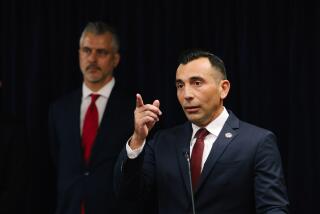U.S. targets illegal sales to enemies
- Share via
WASHINGTON — Moving to close what officials say is a gaping hole in the U.S. national security safety net, the Justice Department will announce today the creation of special task forces around the country to prevent unfriendly nations such as Iran from illegally obtaining U.S.-made parts and technology for their militaries and fledgling nuclear, biological and chemical weapons programs.
The National Counterproliferation Initiative aims to crack down on the black-market networks that U.S. officials believe have flourished worldwide for decades and continue to clandestinely provide American hardware and software to numerous nations and possibly to terrorist organizations.
Many of those nations are aggressively using middlemen, front companies and black marketeers to obtain U.S.-made parts that they cannot buy directly because of trade restrictions. The products include components for nuclear weapons systems, guidance systems for rockets and missiles, and base ingredients for chemical and biological weapons.
The problem was underscored in two separate cases nearly four years ago, when Israeli-born trafficker Asher Karni was caught illegally shipping suspected U.S. nuclear components to Pakistan for its atomic bomb arsenal and Pakistani scientist Abdul Qadeer Khan was caught selling his country’s nuclear parts and technology to Iran, Libya and North Korea.
Since then, the United States has had some success with stopping the flood of parts and technology taken out of the U.S. and into hostile countries by other countries’ middlemen. That has included a series of enforcement actions against traffickers believed to be selling U.S.-made jet fighter parts to Iran. The country is blocked by various American embargoes from buying the parts.
--
Combating turf battles
But the enforcement effort has been hampered by bureaucratic turf battles between various federal law enforcement and intelligence agencies and a lack of involvement by seasoned federal prosecutors who know how to pursue such complex and time-consuming international cases, according to senior U.S. officials involved in the effort and other experts.
The Government Accountability Office has been issuing stinging reports about the lack of coordination and information-sharing among U.S. agencies since at least 1982, concluding last year that the continuing dysfunction has severely hampered efforts to bring criminal cases against traffickers.
In a December report, the independent watchdog agency said that although more than 40 individuals or companies were convicted of more than 100 criminal violations of export control laws in 2005, many of the long-standing “weaknesses and vulnerabilities” it uncovered years earlier have yet to be addressed.
Experts, including many current and former law enforcement and regulatory officials, say there are so many gaps in the enforcement system that the extent of the problem remains largely unknown. The new task forces, modeled on a pilot project in New York, are expected to address some of those problems by having specially trained prosecutors coordinate “export violation” investigations within their districts and ensure that they are a top priority, senior Justice Department officials said in interviews.
U.S. Attorney Michael J. Garcia created the New York task force two years ago because his various experiences as a Justice Department counter-terrorism prosecutor, a senior Commerce Department official and the head of the Immigration and Customs Enforcement made him realize that a lot of potential export violation cases were not being pursued because of a lack of coordination, information-sharing and focus on the issue, he said in an interview.
“It’s not sexy,” Garcia said of such cases. “But it is a huge threat to our national security.”
--
Cases consolidated
The Justice Department recently began consolidating the investigation and prosecution of such cases under Steven W. Pelak, a veteran federal prosecutor who was appointed to serve as the Justice Department’s first national export control coordinator.
Pelak is responsible for helping Justice Department prosecutors handle the complex investigations and prosecutions, which often take several years and the cooperation of numerous U.S. law enforcement, licensing and intelligence agencies, and foreign governments.
Pelak also has been charged with putting pressure on U.S. attorney’s offices to develop cases involving the illegal exports of arms and sensitive technology, and to mediate disputes among the various agencies that traditionally have investigated such cases by themselves.
“It is no secret that many foreign countries and terrorist organizations are actively seeking to acquire sensitive U.S. technology and equipment to advance their weapons systems and, in some cases, their weapons of mass destruction programs,” Assistant Atty. Gen. Kenneth L. Wainstein, head of the Justice Department’s national security division, said when he announced Pelak’s appointment in June.
Several senior law enforcement officials said Tuesday that the establishment of task forces would do little, at least initially, to combat the threat posed by the illegal trafficking because many U.S. attorney’s offices would need to build an interagency team from scratch after handling few, if any, cases of this type.
“It’s a start. Hopefully it will get everybody playing nice together as opposed to some of the issues that have happened in the past,” involving agencies not cooperating or communicating with one another, said a senior law enforcement official who requested anonymity due to the sensitivity of the interagency negotiations.
The official cited the months of delays in just creating the task force concept, as the FBI, Department of Homeland Security, Commerce Department and military argued about what their roles would be.
--
More to Read
Sign up for Essential California
The most important California stories and recommendations in your inbox every morning.
You may occasionally receive promotional content from the Los Angeles Times.













